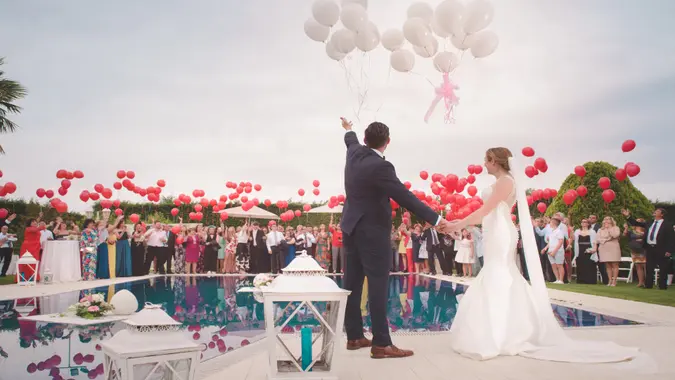Rachel Cruze: Fewer People Are Getting Married Because It’s Too Expensive–Here’s How To Save

Commitment to Our Readers
GOBankingRates' editorial team is committed to bringing you unbiased reviews and information. We use data-driven methodologies to evaluate financial products and services - our reviews and ratings are not influenced by advertisers. You can read more about our editorial guidelines and our products and services review methodology.

20 Years
Helping You Live Richer

Reviewed
by Experts

Trusted by
Millions of Readers
Financial expert Rachel Cruze shed light on a striking trend: fewer millennials and Gen Zers are walking down the aisle. Many believe it’s just too expensive. Here’s what Cruze had to say about couples delaying marriage as well as a few tips for saving money.
Misconceptions about Marriage and the Economy
An eye-opening 73% of Gen Zers believe getting married is too pricey in today’s economy, according to a survey conducted by Thriving Center of Psychology. Although couples are hesitant to tie the knot because of the cost, Cruze distinguishes the cost of a wedding from the cost of marriage.
During an episode of The Ramsey Show, she points out that after marriage, two incomes often merge, making life less costly–not more. However, the staggering average U.S. wedding price of $30,000 (and even higher in metropolitan areas) explains why many are balking at the idea of matrimony.
Cruze questions the timing of spending a fortune on weddings during economic downturns, acknowledging the pressures but advocating for practicality. With inflation, venue rentals, catering, and more can be pricey, yet it’s the lavishness of modern weddings–often driven by social expectations–that inflates the costs. Reflecting on her marriage, Cruze suggests that while marriages have ups and downs, they also bring companionship and beauty into life.
Ramsey Show co-host George Kamel adds that weddings don’t have to break the bank. You can have a meaningful ceremony on a budget.
“Is it tough times out there for a lot of people? Yes,” said Kamel. “[I get] that it’s a tough time to buy a house, but you don’t have to go spend $30,000 on a wedding.”
Rethinking Wedding Must-Haves
So, what’s really needed for a wedding? Cruze breaks it down, noting cultural variations, but for a typical American wedding, the list is extensive: invitations, attire, venue, officiant, photography, videography, catering, flowers, music, decor, and transportation, among others. Yet, she highlights that most of these are wants, not needs. To get married, all you really need is a license and someone legally authorized to officiate.
Choosing What Matters Most
Cruze reflects on her wedding and prioritizes photography over videography, food and drinks over a DJ or band, and the atmosphere over other frills. She admits she would opt for a simpler ceremony and a larger celebration, emphasizing the marriage over the event itself. With a focus on saving, she challenges the idea that a successful wedding is defined by its extravagance.
Crafting a Budget-Friendly Celebration
Finally, Cruze addresses the heart of the matter: weddings don’t have to break the bank. The goal is to have a memorable day without the financial hangover. She encourages couples to spend within their means, plan a party they can afford, and invest in the marriage more than the wedding day.
The Takeaway
Cruze offers a fresh perspective on modern weddings. It’s not about the cost–it’s about starting a life together without unnecessary debt. By focusing on what truly matters and understanding the difference between wants and needs, couples can celebrate their union without the financial strain that often comes with a traditional wedding.
Editor's note: This article was produced via automated technology and then fine-tuned and verified for accuracy by a member of GOBankingRates' editorial team.
 Written by
Written by 
























